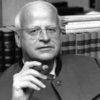Tag: Grace
October 27, 2024–Justification by Grace through Faith!
Chris Heavner, Clemson, SC Warm-up Question At what point did you realize that this week is Reformation Sunday? Have you been planning for weeks? Did you make sure your red clothing was washed and ready? Is this devotion your first reminder? Reformation? Renewal? Realignment? Reformatting? “Reformation” is one of those words which can refer to a general reforming of “an institution or practice,” or it can refer to the events which began in Wittenberg, Germany in the 16th century. Which reference is best known in your community? I had opportunity to be in Wittenberg, Germany on Reformation Day in 2022. …
Created Grace
I have pressed the idea for decades now, after being alerted to these things by my former historical theology seminary professor (and still mentor), Dr. Ron Frost, in regard to Thomas Aquinas’ synthesis of Aristotelian categories with Christian [Augustinian] theology. I am referring to the Thomist thinking on created grace. There are many retrievers of scholastic Reformed theology these days, inclusive of Matthew Barrett, in his own idiosyncratic way. Richard Muller has identified the swath of Post Reformed orthodox theology as Christian Aristotelianism. This would be another way of simply saying (for the most part): Thomism or a neo-Thomism of…
Disruptive Grace as Protology and Eschatology
Grace was disruptive in the protology (beginning Gen 1:1ff) just as Grace is disruptive in the eschatology (the ‘end’ II Cor 5:17 etc). As such there is no stable creation (nature), there is only its enduring Word of upholding wherein stability is found. The continuity of the creation, and its various “properties,” is not based in an inherent independence of its own (waiting for discovery abstract from God’s intensive witness in the Christ), but upon the Grace of God’s Word that continuously gives it life, even in the face and reality of its certain death (Rom 8:18ff). That is to…
The Free Grace of God Counterposed with a Law Based Grace
How does the Christian know the depth of sin; how does anyone? How does a Christian have knowledge of themselves; how does anyone? According to Scripture we only know the depth of human sin through God’s Self-revelation in Jesus Christ. To think sin, to think humanity even, from any other ground than the ground of God’s Light of Light for the world in Jesus Christ will give us a skewed sense, a perverted perspective on just who we are as fallen humanity. Until we come to the realization and understanding of the depth dimension of our status as fallen creatures,…
What is History According to Barth’s Theology?: On the Covenant of Grace
Theology ultimately should be a very concrete thing, at least for the Protestant Christian. We are people of the Word of God; we are people who have been radically brought into the life of God by a deep sense of the theology of God’s Word as that has confronted us in the face of a man from Nazareth. It is this Word-grounded reality upon which we, then, as Christians think a God-world / world-God relation; that is, through the analogy of the hypostatic union, of the Theanthropos Godman, Jesus Christ. And it is as we have come to know this…
Why Thomas Aquinas is Not the Protestant’s Savior: On His Doctrina of Grace
Thomas Aquinas, the Angelic Doctor of the Roman Catholic church, is a Doctor of Theology located in the 13th century. When this is appreciated, things go better. If we could look at him, purely historically, this would be a better way. But instead, people, in particular, Protestant theologians are attempting to retrieve Aquinas’ theology, and the broader Thomist mantle in general, for what they see as a necessary corrective for the evangelical turn into heterodox and heretical positions in regard to doctrine and its subsequent praxis as it is applied to the daily lives of its adherents. But is Aquinas…
The Sermon on the Mount as the Postscript of the Covenant of Grace
Covenant theology in confessional Reformational theology is its hermeneutical key. Karl Barth, a Reformed theologian, doesn’t stray from this key, but as is typical with Barth he reformulates Covenant (or Federal) theology such that Jesus Christ becomes the key, the regulative ground and condition of the covenant itself. Indeed, rather than operating with two aspects of the covenant—i.e., the covenant of works, covenant of grace—as classical Covenantal theology does, Barth retextualizes this framework by reducing the two covenants into one; viz. the covenant of grace. For Barth, the covenant of grace is the supralapsarian (before/above creation)/fall) basis, the inner reality…
The Depersonalization of God’s Grace by the Thomists Reformed and others
What they aren’t telling you is that when you receive Aristotelian Christianity, when you recover Thomist theology, particularly in the Protestant Reformed scholastic flavor, for our purposes, you’re getting a doctrine of grace, and thus God, that thinks grace as a quality, a substance. Grace is depersonalized in this frame, as such the person of Christ is ruptured from the work of Christ allowing for a ‘natural’ space to obtain within a God-world relation. This is the combine of ‘grace perfecting nature’ ‘revelation perfecting reason.’ This is what the scholastic Reformed are pushing onto the “unbeknowing” masses, particularly the younger…
Without Grace Nature Cannot Be Perfect: Thoughts on an Irenaean Thomist Distinction
Helmut Thielicke offers an important anthropological distinction, one that stems early on from someone as astute as Irenaeus, and then becomes appropriated and modified by someone as seismic, in the Latin church, as Thomas Aquinas. If this is not understood as a basic theological-anthropological datum vis-à-vis some form of classical theism, engaging with the theological past into the present will become immediately unintelligible—which I would suggest is why so much of popular apologetics and theologics that we see pervasive, particularly in the online theological world, ends up being an exercise in futility. I digress. Let’s hear from Thielicke on this all-important…






